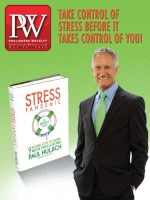Guided by the mission to put life’s energy in the hands of readers, Tokyo-based Sunmark Publishing publishes books about self-help/improvement, health, and general well-being. Company president and publisher Nobutaka Ueki says, “Everything that works in accordance with nature is important. A book to us is a form of energy. After working with an author to create an energy-filled book, we carry out a series of promotional campaigns to boost the book with even more energy.” Sunmark, he adds, produces positive-energy books that advocate the joy of living and seek to provide relief from the stresses of life. “A book based on scandals may sell like hot cakes, but will ultimately produce negative energy. This is not for us.”
Believing in the universality of challenges, hopes, and dreams regardless of race, language, and location, Ueki aims to make his bestsellers available to overseas readers. The company’s current #1 title, The Life-Changing, Pulsing Magic of Cleaning Up by debut author Marie Kondo, for instance, has sold 1.25 million copies since January 2011 and is now available in Chinese, Korean, and German. It is #9 in Taiwan in overall sales through online bookstores. Editorial director Tomohiro Takahashi says, “The eight months spent polishing the manuscript with the author is worth every minute. We do not outsource the editorial function, and each of our 15 in-house editors works very closely with our authors.” For the editors to be able to contribute constructively to a book, Ueki ensures that “they do even more research than the author. That is our editorial principle.”
Other new bestsellers include Yoshinori Nagumo’s Being Hungry Makes You Healthy (500,000 copies sold since its January 2012 release), Hiroyuki Kobayashi’s What Makes That Good for Your Health (420,000 copies), and Junichiro Kameda’s Why Successful Business People Use Big Wallets (260,000 copies, with the Chinese edition now #4 on China’s online bookstore Dangdang.com). Last year, titles by Kondo, Kameda, and Kobayashi ranked #6 (in the general category), #7 (business), and #8 (nonfiction), respectively, on Japan’s bestsellers list.
But for English-speaking readers, the most recognizable Sunmark title is perhaps Masaru Emoto’s The Hidden Message in Water, which was a New York Times bestseller for 28 weeks after the English edition came out in 2004. Together, the English and German editions have sold more than half a million copies—a remarkable achievement for an author and publishing company scarcely known in the West. The Chinese edition, also published in 2004, has already surpassed the one million–copy mark. Then there is A Compass to Fulfillment by Kazuo Inamori (founder of Kyocera, an electronics company), published in 2005, with 1.7 million copies in circulation worldwide.
For Ueki, his company’s sleeper hit remains Shigeo Haruyama’s 1995 book, A Great Revolution in the Brain World, the second bestselling title in Japan’s publishing history at that time, with sales exceeding 4.1 million copies. So far, Sunmark has five million-copy bestsellers, something that Ueki finds harder to achieve today when readers flit rapidly from one title to another. “Hitting one million copies or landing on the bestseller list is a byproduct of the process. We just want to publish the best for our readers. If the author is unknown, but the message is inspirational or powerful and would bring the right energy to our readers, we will publish it. In fact, unknown authors have even more potential to astound us with their popularity.” Not surprisingly, Sunmark ranks #1 in the Japanese book industry in the ratio of bestsellers to the number of books published.
Translations account for roughly 15% of Sunmark’s catalogue. Richard Carlson’s Don’t Sweat the Small Stuff (1.731 million copies sold) and James Allen’s As a Man Thinketh (560,000 copies), for instance, rank #2 and #8, respectively, on its all-time bestseller list. German mind reader/entertainer Thorsten Havener’s Ich Weiss, Was Du Denkst, released last August, has already sold 420,000 copies.
Surprisingly, Sunmark, which was established in 1971, has no advertising department. Instead, Ueki plans individualized promotional campaigns for each title based on what has worked for similar books. For Kondo’s title, for instance, Takahashi showed the book to 10 influential people in the blogosphere and magazine sector. Next came an advertisement with 17 reader comments in the Asahi Shimbun, one of the country’s five national newspapers. When the ad was placed, the book was being reprinted every other day to meet rising demand. More advertisements on Tokyo’s commuter trains and in other newspapers followed. “Newspaper advertising works very well in Japan, especially for health books. We also capitalize on TV programs about the author to promote her title,” says Ueki, whose sales team works to keep bookstore returns low. All Sunmark’s bestsellers boast a return rate of less than 2%.



 Volume 259
Issue 21
05/21/2012
Volume 259
Issue 21
05/21/2012





